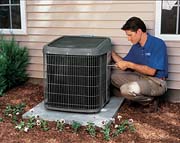Amazingly, next to the stress-filled 13 SEER bottleneck is the express lane moving at maximum speed.
I assume you want to get into that lane, right?
Cruising Into The Express Lane
In my estimation, there are two sure-fire ways to go faster than the competition.
Customized comfort is a process that allows a seller to determine a buyer's specific desires so a solution can be tailored that exceeds expectations. (Need a refresher? Refer to "It's Time to Retire Good-Better-Best," The News, Marketing Indoor Comfort supplement, March 7.)
2. Differentiate with unique benefits.
The power of differentiation peaks when sellers offer benefits buyers want and the competition doesn't offer. For instance, in our industry, heat pumps provide an amazing opportunity for differentiation. While they provide unique benefits consumers want, most contractors would rather sell gas furnaces than heat pumps. Interesting, isn't it?
Contractors who don't usually offer heat pumps typically give the same reasons:
A. "Heat pumps don't work in cold climates."
B. "It costs less to heat with gas."
Over the years many consumers have heard, "You don't want a heat pump. They blow cold air." The truth be told, a properly designed and professionally installed heat pump provides the same comfort as a gas furnace. According to research, heat pumps do an outstanding job of providing year-round comfort, even in extremely cold climates.
For example, Omaha Public Power District found 89 percent of the owners of newly installed heat pumps rated their comfort "good" to "very good." Meanwhile, a Minnesota Cooperative Power Association heat pump satisfaction survey showed:
a. 83 percent said overall operation met or exceeded their expectations.
b. 47 percent considered energy savings the most desirable feature.
c. 14 percent found even heat the greatest benefit.
d. 13 percent said cleanliness was the most important change they noticed.
e. 13 percent rated the ability to both heat and cool as the most desirable benefit.
And keep this in mind: The above studies were done over 10 years ago, long before the advances in heat pump technology we enjoy today.

Heat Pumps Can Cost Less To Operate
Please remember this: Heat pumps run on electricity and electric prices vary with demand. Depending upon your locale, heat pumps may actually cost less to operate than a gas appliance.With the above in mind, know that in the summer most electric utility companies add expensive oil or natural gas-fired generation to meet peak demand. Winter is a much different story. Primarily due to the huge reduction in air conditioning use, most utilities are able to use lower-cost coal, hydro, or nuclear energy to produce winter electricity.
To help these "base load" generators maintain efficient load (and add winter revenue), many electric utility companies offer deep discounts in winter heat pump rates. In Chicago, for example, the 8.27 cent summer residential rate is reduced to 3.73 cents to encourage heat pump use.
Another thing to remember: The spread between winter electricity and gas prices determines the most economical energy for heating. (To compare an 8.5 HSPF heat pump to a 90-percent-efficient gas furnace, go to www.energyright.com and click on "Dare to Compare Gas Furnace vs. Heat Pump." At $1/therm gas and 6 cent/kWh electricity in Tennessee, the owner of a 2,000-square-foot home would save about $328 heating that home every year.)
Electric utility companies that don't offer heat pump rates may offer residential consumers a "time of day" rate. This off-peak discount works because heat pumps run longer at night. During the day, passive solar heat can significantly reduce the need for mechanical heating. In Phoenix, for example, the 10 cent/kWh day rate drops to 4.5 cents at night.
Singing Its Praises
Know that unique heat pump features include a back-up heating system; no combustion to worry about; winter savings, which helps fund better comfort; and lower future costs.Also, most heat pump systems allow consumers to turn on auxiliary heat strips if the primary refrigerant-based heating system becomes inoperable. "Emergency heat" can provide priceless comfort and peace of mind, especially for people living in extremely cold climates.
Know also that a heat pump reduces or eliminates combustion concerns. Based on the number of CO detectors sold each year, a lot of homeowners are worried about the effects of carbon monoxide. One less gas-consuming device in the home can provide peace of mind. If the furnace is the only gas appliance in the house, 100 percent of the homeowner's concerns about carbon monoxide can be eliminated with a heat pump.
There is a growing percentage of the population that loves this feature. As an added benefit, once the last gas appliance is removed, the gas connection fee can be eliminated, usually saving the homeowner an additional $70 to over $100 per year.
In the end, energy savings can fund better comfort. Let's face it: Everyone wants better comfort, but not all can afford it.
In the case of heat pump heating savings, this can make a top-of-the-line comfort system more affordable. The consumer who saves $327 per year automatically gets $27 more each month to invest in comfort-enhancing features like variable airflow, multistage cooling and heating, and high-effect air purification.
There are future energy savings with a heat pump, too. As our population ages, many folks want some idea of what it's going to cost to heat and cool their home after they retire. There is no doubt all energy costs will rise. However, due to the effects of supply and demand, the cost of natural gas likely will increase faster and more dramatically than electricity over the life of a consumer's new comfort system.
Lord Kelvin conceived the "heat multiplier," a concept for using refrigerating equipment for heating. There is no way back in 1853 he could imagine how his idea would become a product that provides great comfort and a tool that provides contractors with a way to get out of the traffic jam and onto the expressway toward maximum success.
Steve Howard is president of The ACT Group, Inc. He can be reached at 800-515-0034 or Steve@NoPressureSelling.com.
Publication date: 04/25/2005

Report Abusive Comment